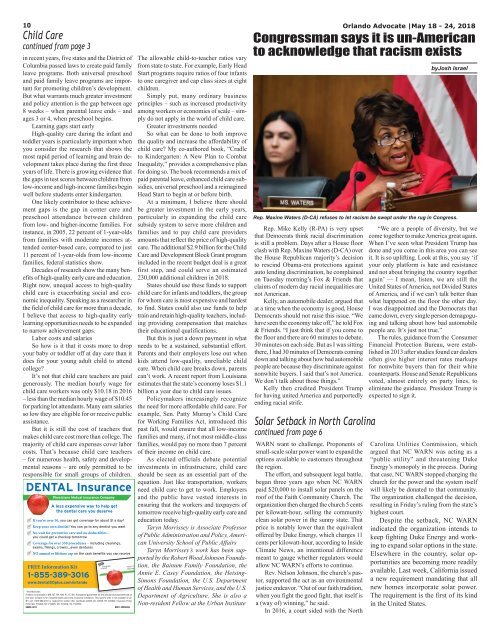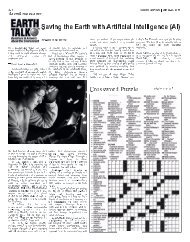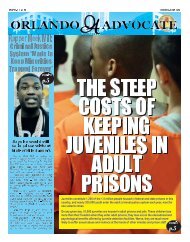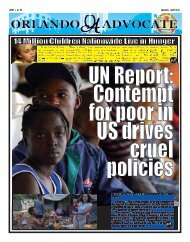Create successful ePaper yourself
Turn your PDF publications into a flip-book with our unique Google optimized e-Paper software.
10<br />
Child Care<br />
continued from page 3<br />
in recent years, five states and the District of<br />
Columbia passed laws to create paid family<br />
leave programs. Both universal preschool<br />
and paid family leave programs are important<br />
for promoting children’s development.<br />
But what warrants much greater investment<br />
and policy attention is the gap between age<br />
8 weeks – when parental leave ends – and<br />
ages 3 or 4, when preschool begins.<br />
Learning gaps start early<br />
High-quality care during the infant and<br />
toddler years is particularly important when<br />
you consider the research that shows the<br />
most rapid period of learning and brain development<br />
takes place during the first three<br />
years of life. There is growing evidence that<br />
the gaps in test scores between children from<br />
low-income and high-income families begin<br />
well before students enter kindergarten.<br />
One likely contributor to these achievement<br />
gaps is the gap in center care and<br />
preschool attendance between children<br />
from low- and higher-income families. For<br />
instance, in 20<strong>05</strong>, 22 percent of 1-year-olds<br />
from families with moderate incomes attended<br />
center-based care, compared to just<br />
11 percent of 1-year-olds from low-income<br />
families, federal statistics show.<br />
Decades of research show the many benefits<br />
of high-quality early care and education.<br />
Right now, unequal access to high-quality<br />
child care is exacerbating social and economic<br />
inequality. Speaking as a researcher in<br />
the field of child care for more than a decade,<br />
I believe that access to high-quality early<br />
learning opportunities needs to be expanded<br />
to narrow achievement gaps.<br />
Labor costs and salaries<br />
So how is it that it costs more to drop<br />
your baby or toddler off at day care than it<br />
does for your young adult child to attend<br />
college?<br />
It’s not that child care teachers are paid<br />
generously. The median hourly wage for<br />
child care workers was only $10.<strong>18</strong> in 2016<br />
– less than the median hourly wage of $10.45<br />
for parking lot attendants. Many earn salaries<br />
so low they are eligible for or receive public<br />
assistance.<br />
But it is still the cost of teachers that<br />
makes child care cost more than college. The<br />
majority of child care expenses cover labor<br />
costs. That’s because child care teachers<br />
– for numerous health, safety and developmental<br />
reasons – are only permitted to be<br />
responsible for small groups of children.<br />
DENTAL Insurance<br />
Physicians Mutual Insurance Company<br />
A less expensive way to help get<br />
the dental care you deserve<br />
If you’re over 50, you can get coverage for about $1 a day*<br />
Keep your own dentist! You can go to any dentist you want<br />
No wait for preventive care and no deductibles –<br />
you could get a checkup tomorrow<br />
Coverage for over 350 procedures – including cleanings,<br />
exams, fillings, crowns…even dentures<br />
NO annual or lifetime cap on the cash benefits you can receive<br />
FREE Information Kit<br />
1-855-389-3016<br />
www.dental50plus.com/orlando<br />
*Individual plan.<br />
Product not available in MN, MT, NH, NM, RI, VT, WA. Acceptance guaranteed for one insurance policy/certificate of<br />
this type. Contact us for complete details about this insurance solicitation. This specific offer is not available in CO,<br />
NY; call 1-800-969-4781 or respond for similar offer. Certificate C250A (ID: C250E; PA: C250Q); Insurance Policy<br />
P150 (GA: P150GA; NY: P150NY; OK: P150OK; TN: P150TN)<br />
6096E-0917 MB17-NM008Ec<br />
The allowable child-to-teacher ratios vary<br />
from state to state. For example, Early Head<br />
Start programs require ratios of four infants<br />
to one caregiver and cap class sizes at eight<br />
children.<br />
Simply put, many ordinary business<br />
principles – such as increased productivity<br />
among workers or economies of scale – simply<br />
do not apply in the world of child care.<br />
Greater investments needed<br />
So what can be done to both improve<br />
the quality and increase the affordability of<br />
child care? My co-authored book, “Cradle<br />
to Kindergarten: A New Plan to Combat<br />
Inequality,” provides a comprehensive plan<br />
for doing so. The book recommends a mix of<br />
paid parental leave, enhanced child care subsidies,<br />
universal preschool and a reimagined<br />
Head Start to begin at or before birth.<br />
At a minimum, I believe there should<br />
be greater investment in the early years,<br />
particularly in expanding the child care<br />
subsidy system to serve more children and<br />
families and to pay child care providers<br />
amounts that reflect the price of high-quality<br />
care. The additional $2.9 billion for the Child<br />
Care and Development Block Grant program<br />
included in the recent budget deal is a great<br />
first step, and could serve an estimated<br />
230,000 additional children in <strong>20<strong>18</strong></strong>.<br />
States should use these funds to support<br />
child care for infants and toddlers, the group<br />
for whom care is most expensive and hardest<br />
to find. States could also use funds to help<br />
train and retain high-quality teachers, including<br />
providing compensation that matches<br />
their educational qualifications.<br />
But this is just a down payment in what<br />
needs to be a sustained, substantial effort.<br />
Parents and their employers lose out when<br />
kids attend low-quality, unreliable child<br />
care. When child care breaks down, parents<br />
can’t work. A recent report from Louisiana<br />
estimates that the state’s economy loses $1.1<br />
billion a year due to child care issues.<br />
Policymakers increasingly recognize<br />
the need for more affordable child care. For<br />
example, Sen. Patty Murray’s Child Care<br />
for Working Families Act, introduced this<br />
past fall, would ensure that all low-income<br />
families and many, if not most middle-class<br />
families, would pay no more than 7 percent<br />
of their income on child care.<br />
As elected officials debate potential<br />
investments in infrastructure, child care<br />
should be seen as an essential part of the<br />
equation. Just like transportation, workers<br />
need child care to get to work. Employers<br />
and the public have vested interests in<br />
ensuring that the workers and taxpayers of<br />
tomorrow receive high-quality early care and<br />
education today.<br />
Taryn Morrissey is Associate Professor<br />
of Public Administration and Policy, American<br />
University School of Public Affairs<br />
Taryn Morrissey’s work has been supported<br />
by the Robert Wood Johnson Foundation,<br />
the Bainum Family Foundation, the<br />
Annie E. Casey Foundation, the Heising-<br />
Simons Foundation, the U.S. Department<br />
of Health and Human Services, and the U.S.<br />
Department of Agriculture. She is also a<br />
Non-resident Fellow at the Urban Institute<br />
Rep. Mike Kelly (R-PA) is very upset<br />
that Democrats think racial discrimination<br />
is still a problem. Days after a House floor<br />
clash with Rep. Maxine Waters (D-CA) over<br />
the House Republican majority’s decision<br />
to rescind Obama-era protections against<br />
auto lending discrimination, he complained<br />
on Tuesday morning’s Fox & Friends that<br />
claims of modern day racial inequalities are<br />
not American.<br />
Kelly, an automobile dealer, argued that<br />
at a time when the economy is good, House<br />
Democrats should not raise this issue. “We<br />
have seen the economy take off,” he told Fox<br />
& Friends. “I just think that if you come to<br />
the floor and there are 60 minutes to debate.<br />
30 minutes on each side. But as I was sitting<br />
there, I had 30 minutes of Democrats coming<br />
down and talking about how bad automobile<br />
people are because they discriminate against<br />
nonwhite buyers. I said that’s not America.<br />
We don’t talk about those things.”<br />
Kelly then credited President Trump<br />
for having united America and purportedly<br />
ending racial strife.<br />
Orlando Advocate |May <strong>18</strong> - 24, <strong>20<strong>18</strong></strong><br />
Congressman says it is un-American<br />
to acknowledge that racism exists<br />
Solar Setback in North Carolina<br />
continued from page 6<br />
WARN want to challenge. Proponents of<br />
small-scale solar power want to expand the<br />
options available to customers throughout<br />
the region.<br />
The effort, and subsequent legal battle,<br />
began three years ago when NC WARN<br />
paid $20,000 to install solar panels on the<br />
roof of the Faith Community Church. The<br />
organization then charged the church 5 cents<br />
per kilowatt-hour, selling the community<br />
clean solar power in the sunny state. That<br />
price is notably lower than the equivalent<br />
offered by Duke Energy, which charges 11<br />
cents per kilowatt-hour, according to Inside<br />
Climate News, an intentional difference<br />
meant to gauge whether regulators would<br />
allow NC WARN’s efforts to continue.<br />
Rev. Nelson Johnson, the church’s pastor,<br />
supported the act as an environmental<br />
justice endeavor. “Out of our faith tradition,<br />
when you fight the good fight, that itself is<br />
a (way of) winning,” he said.<br />
In 2016, a court sided with the North<br />
byJosh Israel<br />
Rep. Maxine Waters (D-CA) refuses to let racism be swept under the rug in Congress.<br />
“We are a people of diversity, but we<br />
come together to make America great again.<br />
When I’ve seen what President Trump has<br />
done and you come in this area you can see<br />
it. It is so uplifting. Look at this, you say ‘if<br />
your only platform is hate and resistance<br />
and not about bringing the country together<br />
again’ — I mean, listen, we are still the<br />
United States of America, not Divided States<br />
of America, and if we can’t talk better than<br />
what happened on the floor the other day.<br />
I was disappointed and the Democrats that<br />
came down, every single person demagoguing<br />
and talking about how bad automobile<br />
people are. It’s just not true.”<br />
The rules, guidance from the Consumer<br />
Financial Protection Bureau, were established<br />
in 2013 after studies found car dealers<br />
often give higher interest rates markups<br />
for nonwhite buyers than for their white<br />
counterparts. House and Senate Republicans<br />
voted, almost entirely on party lines, to<br />
eliminate the guidance. President Trump is<br />
expected to sign it.<br />
Carolina Utilities Commission, which<br />
argued that NC WARN was acting as a<br />
“public utility” and threatening Duke<br />
Energy’s monopoly in the process. During<br />
that case, NC WARN stopped charging the<br />
church for the power and the system itself<br />
will likely be donated to that community.<br />
The organization challenged the decision,<br />
resulting in Friday’s ruling from the state’s<br />
highest court.<br />
Despite the setback, NC WARN<br />
indicated the organization intends to<br />
keep fighting Duke Energy and working<br />
to expand solar options in the state.<br />
Elsewhere in the country, solar opportunities<br />
are becoming more readily<br />
available. Last week, California issued<br />
a new requirement mandating that all<br />
new homes incorporate solar power.<br />
The requirement is the first of its kind<br />
in the United States.













